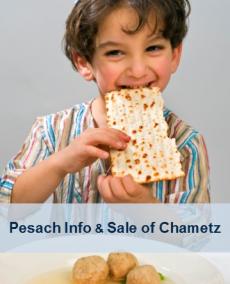What is chametz?
The term chametz applies to fermented food or drinks made from wheat, barley, rye, oats and spelt. When these grains or their derivatives come into contact with water, fermentation is assumed to have taken place and the food is considered chametz unless, like matza, it is manufactured under very specific conditions and with rabbinical supervision.
Many common food ingredients such as glucose, caramel, citric acid and vitamin C are often made by fermentation of wheat.
What is kitniyot?
The term kitniyot refers to grains and legumes not consumed on Pesach by Ashkenazi Jews. Examples include beans, corn, peas, lentils, rice, mustard, peanuts, chick peas and other pod vegetables. Since there are many kosher l’Pesach products made for the Sephardi market which do contain kitniyot, it is important for Ashkenazi consumers to check the labels carefully. For further information click here.
Is quinoa kosher for Pesach?
Some Kashrut Agencies in the USA allow it on Pesach, although many Israeli authorities consider it kitniyot. We recommend that quinoa is not used on Pesach unless it is specifically needed for health reasons, in which case it should preferably be purchased with a kosher l’Pesach hechsher. There are a number of varieties on sale in kosher stores.
Can I feed my baby regular baby milk?
Kosher l’Pesach baby formula is available from kosher shops. In cases where this cannot be used, see the KLBD Approved Products list. Separate utensils should be used as baby milks, including kosher l’Pesach baby formula, commonly contain kitniyot. Since feeding bottles normally come into contact with chametz, it is recommended to purchase new ones for Pesach.
Can I give soya or rice milk to a child with an allergy to cows’ milk?
It would be preferable to use products with a kosher l'Pesach hechsher which do not contain kitniyot, such as Gefen Coconut Milk.
If neither of these are suitable, email info@kosher.org.uk for further advice.
Is it permissible to use Egg Replacers on Pesach for those who are allergic to eggs?
Email info@kosher.org.uk for advice from the KLBD about permitted products.
Can diabetics use regular glucose tablets?
Glucose tablets are not suitable for Pesach, but Glutose15 Lemon Gel is an excellent alternative.
Are plain, cut up fruit and vegetables from the supermarket ok?
Precut fresh fruit and vegetables are not approved due to the fact that Citric Acid (potentially of chametz origin) is commonly used to prevent discolouration.
There is no problem with precut fresh herbs or herbs grown in pots. Chopped herbs should be avoided as they cannot easily be checked for infestation.
Is there any problem with buying frozen fruit and vegetables?
Unsupervised frozen fruit and vegetables should not be used because factories may use ascorbic or citric acid as a processing aid, which is often derived from chametz sources.
Do basic items such as tea and coffee, sugar and salt, really need to be kosher for Pesach?
Products such as Earl Grey tea, decaffeinated tea and coffee, herbal teas and other more sophisticated products may contain actual chametz, whilst icing sugar may contain cornflour as a free-flow agent. The long standing custom in the UK and beyond is to ensure that all manufactured products have been specifically approved for Pesach to avoid errors. Some Nescafe coffees, Taylors of Harrogate Yorkshire Tea and Tate & Lyle sugars are now kosher for Pesach all year round. See the list of Approved Products for details.
What can I feed my pet on Pesach?
Since one is not allowed to have chametz in one’s possession over Pesach, nor to derive benefit from it, one cannot feed pets on Pesach with foods containing chametz, nor can one keep such food in the house.
Many common brands of pet foods contain cereal and are therefore not suitable for Pesach. For general advice on suitable alternatives and to view the list of pet foods approved for Pesach by the KLBD, click here.
Can I use disposable tableware?
There is no problem with polystyrene, plastic and Chinet products, aluminium foil or foil containers. As paper plates and lids for foil containers usually contain starch which may be chametz, some people prefer to avoid their use particularly with hot or wet food.
KLBD-P certified disposables are available from kosher shops.
Baking parchment, cake tin liners and kitchen towel which have been checked by the KLBD are listed on www.passover.isitkosher.uk.
Is there a problem with regular bottled water?
All bottled, still and naturally carbonated water is fine. Artificially sparkling water may be carbonated with CO2 from the brewing industry and should be avoided unless specifically approved. For a list of products checked by the KLBD, see the Approved Products list under ‘Mineral Water’. It is always better to buy products that are made under rabbinical supervision for Passover.
What is the position with diet drinks certified kosher for Pesach, such as Diet Coke?
Diet drinks are sweetened with aspartame, which is made from ‘kitniyot shenishtanu’ - kitniyot which has gone through a significant chemical change.
Although as a general rule, such a change alone is not relied upon as a reason to permit a non-kosher substance, some Kashrut Authorities are lenient in the case of kitniyot which is only a minhag (albeit a very ancient and important one). Other authorities rule one should be strict even in the case of kitniyot. For one who wants to be machmir (strict), it is preferable to avoid.
Is one allowed to eat items made with Matza Meal on Erev Pesach?
It is prohibited to eat matza from dawn on Erev Pesach until Seder. This prohibition includes items made with matza meal such as cakes or biscuits but items cooked or deep-fried such as knaidlech or fried fish balls are fine.
Is one allowed to eat Egg Matza on Pesach?
Ashkenazim do not allow Matza Ashira on Pesach except for the old and infirm. However, it is ideal to eat before Pesach in areas which have been cleared of chametz, but only until the last time for eating chametz.
Are all eggs kosher for Pesach?
Regular hens' eggs, both white and brown, may be used on Pesach. They should, of course, be checked for blood spots. For further information click here and refer to the note about eggs.
There is no issue of chametz with the ink used to stamp eggs.
Does a non-Jew really own my chametz on Pesach?
Yes! The sale of chametz carried out today is a legally binding sale using a contract. The sale is usually carried out by a rabbi on behalf of his community. Various methods of transaction are used including the buyer making a down payment; exchange of properties; handing over of keys; various legal documents, and in some cases a guarantor on behalf of the buyer.
The buyer purchases outright all the products listed on the sale forms. After Pesach, the rabbi and the non-Jew meet up again at which point the rabbi demands payment in full or alternatively he will offer to buy back chametz. When the non-Jew chooses the latter, the chametz reverts to the possession of the original owner.
Click here for information about how to sell your chametz via the KLBD.




